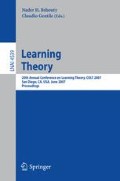Abstract
Bounded parameter Markov Decision Processes (BMDPs) address the issue of dealing with uncertainty in the parameters of a Markov Decision Process (MDP). Unlike the case of an MDP, the notion of an optimal policy for a BMDP is not entirely straightforward. We consider two notions of optimality based on optimistic and pessimistic criteria. These have been analyzed for discounted BMDPs. Here we provide results for average reward BMDPs.
We establish a fundamental relationship between the discounted and the average reward problems, prove the existence of Blackwell optimal policies and, for both notions of optimality, derive algorithms that converge to the optimal value function.
Access this chapter
Tax calculation will be finalised at checkout
Purchases are for personal use only
Preview
Unable to display preview. Download preview PDF.
References
Givan, R., Leach, S., Dean, T.: Bounded-parameter Markov decision processes. Artificial Intelligence 122, 71–109 (2000)
Strehl, A.L., Littman, M.: A theoretical analysis of model-based interval estimation. In: Proceedings of the Twenty-Second International Conference on Machine Learning, pp. 857–864. ACM Press, New York (2005)
Auer, P., Ortner, R.: Logarithmic online regret bounds for undiscounted reinforcement learning. In: dvances in Neural Information Processing Systems 19, MIT Press, Cambridge (2007) (to appear)
Brafman, R.I., Tennenholtz, M.: R-MAX – a general polynomial time algorithm for near-optimal reinforcement learning. Journal of Machine Learning Research 3, 213–231 (2002)
Even-Dar, E., Mansour, Y.: Convergence of optimistic and incremental Q-learning. In: Advances in Neural Information Processing Systems 14, pp. 1499–1506. MIT Press, Cambridge (2001)
Nilim, A., El Ghaoui, L.: Robust control of Markov decision processes with uncertain transition matrices. Operations Research 53, 780–798 (2005)
Bertsekas, D.P.: Dynamic Programming and Optimal Control. Vol. 2. Athena Scientific, Belmont, MA (1995)
Burnetas, A.N., Katehakis, M.N.: Optimal adaptive policies for Markov decision processes. Mathematics of Operations Research 22, 222–255 (1997)
Author information
Authors and Affiliations
Editor information
Rights and permissions
Copyright information
© 2007 Springer Berlin Heidelberg
About this paper
Cite this paper
Tewari, A., Bartlett, P.L. (2007). Bounded Parameter Markov Decision Processes with Average Reward Criterion. In: Bshouty, N.H., Gentile, C. (eds) Learning Theory. COLT 2007. Lecture Notes in Computer Science(), vol 4539. Springer, Berlin, Heidelberg. https://doi.org/10.1007/978-3-540-72927-3_20
Download citation
DOI: https://doi.org/10.1007/978-3-540-72927-3_20
Publisher Name: Springer, Berlin, Heidelberg
Print ISBN: 978-3-540-72925-9
Online ISBN: 978-3-540-72927-3
eBook Packages: Computer ScienceComputer Science (R0)

